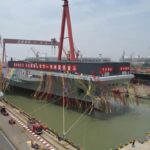
(Recasts, adds details, Taiwan government comment, byline, television and pictures available)
By Martin Quin Pollard
BEIJING, June 17 (Reuters) – China launched its third aircraft carrier on Friday, the domestically designed and built Fujian, named after the province opposite self-ruled Taiwan, sending a statement of intent to rivals as it modernises its military.
Chinese President Xi Jinping has made overhauling the world’s largest armed forces a central part of his agenda, seeking to project power well beyond China’s shores, though the government says it has no hostile intent.
Champagne, colourful ribbons, water cannons and smoke were deployed to celebrate the new carrier’s launch and official naming at a ceremony at the Jiangnan shipyard in Shanghai, state media reported.
Dozens of navy personnel lined up in front of the ship and sang the national anthem at the ceremony, which was attended by senior officials including Xu Qiliang, vice chairman of the Central Military Commission.
The aircraft carrier features a full-length flight deck with a catapult launch system, according to state media.
The Fujian will join the Shandong, commissioned in late 2019, and the Liaoning, which China bought second-hand from Ukraine in 1998 and refitted domestically.
China is still honing its ability to operate the carriers, and integrate them into battle groups, something the United States has been doing for decades.
Only the United States, with 11 aircraft carriers, has more of the vessels. Ranked just below China, Britain has two in operation.
The Fujian’s launch demonstrates the military’s increasing capability at a time of rising tension with the United States over Chinese-claimed Taiwan, and Beijing’s claims to the South China Sea.
The new carrier was named after the coastal province of Fujian, just across the Taiwan Strait from Taiwan and home to the Eastern Theatre Command of the People’s Liberation Army.
Taiwan is a thriving democracy but China considers the island its own territory and has never renounced the use of force to bring it under its control.
Taiwan’s defence ministry said in a statement sent to Reuters about the new carrier that it “attaches great importance” to China’s military developments.
Taiwan “incorporates this into enemy situation research in a forward-looking manner, uses innovative asymmetric thinking, and actively develops countermeasures to effectively implement the military strategy of defensive persistence and heavy deterrence”, it added.
Taiwan controls two groups of islands that are geographically part of Fujian and sit just off its coast – Kinmen and Matsu – and which, during the height of the Cold War, were regularly bombarded by China. (Reporting by Ryan Woo and Martin Pollard; Additional reporting by Yimou Lee and Ben Blanchard in Taipei; editing by Richard Pullin and Stephen Coates)




